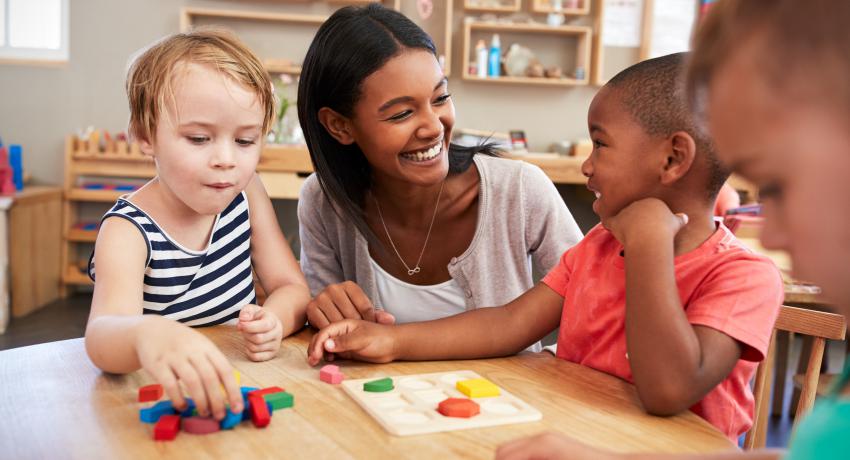Warm and positive relationships between knowledgeable caregivers and young children are critical to child engagement. Along with good relationships are great environments—these are places where children’s curiosity is piqued, they can move and play, and they can be comfortable and relaxed.
Good relationships and environments help children engage in learning and support healthy child development. Child engagement in the learning environment is also a predictor of ongoing academic and social success, as noted in a research brief provided by the University of Virginia Curry School of Education.
Children are considered positively engaged when they are involved in a meaningful way with the activities and people present in their environment. Teachers support meaningful child engagement when they provide culturally-appropriate materials and experiences that attract children’s attention and encourage them to participate in a variety of ways that maximize learning. Selecting and arranging materials in the learning environment can be an exciting part of being an early educator. When selecting materials, educators should choose those that help children reach learning objectives, support positive interactions with peers and adults, and promote independence.
Parents are thinking about what engages their children and why this is important. Two parents of young children in child care in Washington state were asked what an engaging environment means to them.
“An engaging environment means that the caregivers are with the children providing activities, paying attention to your child, and then responding to their reactions,” said Quyet Le, the parent of an 18-month-old. “They see something change in your child and the caregiver provides developmentally appropriate next steps to foster their growth.”
To Elizabeth Maynard, the mother of a 3-year-old child, an engaging environment means “adults are on the ground talking and playing with the children and fully being present. It is extremely important because it is the most meaningful thing for the child, just getting to play or interact uninterrupted and without technology allows them to have meaningful experiences and learn and grow.”
Choosing child care is an important decision for families, and they deserve to know that their children are receiving care that promotes their unique skills and cultures and supports the development of the whole child. Whether a family chooses a home or center setting, a positive learning environment is vital for children.
DCYF’s Early Achievers is a quality rating improvement system that helps families understand their child care provider’s progress in quality improvement. The rating system provides information about the quality of early learning programs so families can feel confident about their child care choice. Early learning professionals are continuously building on the skills they develop through Early Achievers, and providers who participate are demonstrating their commitment to improving the quality of care for children.
For more information, visit https://dcyf.wa.gov/services/earlylearning-childcare/early-achievers.
Citation: Williford, A.P., Vick Whittaker, J.E., Vitiello, V. E., & Downer, J.T. (2013). Children’s engagement in preschool and the development of self-regulation. Retrieved from: http://curry.virginia.edu/uploads/resourceLibrary/CASTL_Research_Brief-Williford_et_al._(2013)_EED.pdf

